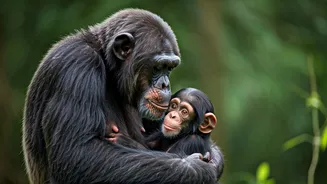Dolphins: Social Bonds
Dolphins, renowned for their intelligence and playful nature, form intricate social bonds. These marine mammals demonstrate affection and empathy within
their pods. Studies suggest that dolphins exhibit grieving behaviors, as has been observed when a pod member passes away. They often stay with their deceased companion for days. Moreover, dolphins show remarkable cooperation, working together to hunt and protect each other. Their social complexity is a testament to their deep emotional lives, making them a prime example of animal empathy. Dolphin's social structures closely mirror aspects of human relationships, with long-lasting bonds and reciprocal support. Their emotional capacity further solidifies their place as one of the most intelligent species on Earth.
Elephants: Family Ties
Elephants are well-known for their strong family bonds and emotional depth. They exhibit a range of emotions, including joy, sorrow, and grief. These large mammals express grief over the loss of family members. They have been observed visiting the bones of deceased elephants, which showcases their understanding of death. Elephants also demonstrate altruistic behavior, helping others in need, regardless of familial ties. This indicates a high degree of empathy and awareness of the feelings of other individuals. Their social structures are complex, with matriarchal leadership and close-knit family units. Elephant communities provide support and care to their members, making them prime examples of empathy and community living.
Dogs: Loyal Companions
Dogs have a deep and well-documented emotional connection with humans. Through centuries of domestication, dogs have evolved to understand and share in human emotions, becoming loyal companions. Studies have shown that dogs experience sadness, joy, and even jealousy. They show affection through physical touch and by seeking out interactions. Their ability to read human body language and emotions is remarkable. Dogs exhibit empathy toward their owners, offering comfort during times of stress. They also form close bonds with other dogs, often displaying a need for social interaction. Their emotional sensitivity is the primary reason why dogs are beloved family members.
Chimpanzees: Societal Dynamics
Chimpanzees, our closest primate relatives, display a sophisticated range of emotions and social behaviors. Chimps have been observed displaying joy through play, sadness through loss, and anger when conflicts arise. Like humans, chimpanzees have social hierarchies and political maneuvering within their troops. They exhibit complex emotions like empathy and altruism, assisting injured members and providing support within their social groups. Chimpanzees can also hold grudges and display revengeful actions. Their capacity for both positive and negative emotions closely resembles the human experience, highlighting their advanced emotional intelligence. Chimpanzees' social dynamics also provide crucial insights into human evolution, showing how our emotional capacities evolved.
Cats: Independent Affection
Cats, often perceived as independent, also show a spectrum of emotions and form deep bonds with humans and other pets. While some cats may appear aloof, they exhibit a range of emotions, including happiness, fear, and affection. Cats are capable of forming strong attachments to their owners, displaying a preference for interaction and physical contact. They demonstrate contentment through purring and kneading. Cats can also display grief when they lose a companion. Their emotional lives are shaped by their experiences and interactions. While they express affection in their own unique way, cats are highly sensitive to their environments and the individuals they share their lives with, displaying complex emotional needs.
Crows: Intelligent Behavior
Crows are incredibly intelligent birds known for their problem-solving skills and complex social behaviors. These birds show a remarkable capacity for recognizing faces and remembering individuals, even after long periods. Crows exhibit emotional responses such as grief, especially after losing a flock member. They can also show compassion and support for other crows. They’re known for engaging in playful behaviors, using tools, and displaying innovative problem-solving skills. Their ability to adapt to changing environments and remember past interactions points to a rich emotional life. Crows offer an intriguing look at intelligence and emotional depth in the avian world.
Rats: Showing Empathy
Rats, frequently dismissed, display surprising emotional and social behaviors. Scientific studies suggest that rats can experience empathy and distress when they witness another rat in pain. Rats are known to prioritize helping others over receiving rewards. They display a range of emotions, including fear, anxiety, and joy. They create strong social bonds with each other. These behaviors demonstrate their capability for empathy and their complex emotional lives. Rats have an ability to understand and respond to the emotional states of others. These insights highlight the underestimated emotional and social depth within the animal world.
Octopuses: Complex Minds
Octopuses, marine invertebrates, are highly intelligent and emotional animals that demonstrate a range of behaviors previously believed to be unique to higher animals. Octopuses are capable of problem-solving. They show personality differences and play with toys, indicating curiosity and emotional responses. They exhibit unique behaviors like changing color to express emotions. Studies suggest that octopuses experience stress, joy, and other complex feelings. Their neurological complexity, coupled with behavioral observations, reveals a surprising depth of emotional and cognitive capabilities, challenging existing perceptions of invertebrate intelligence. Octopuses have a profound capacity for emotion and problem-solving, making them a fascinating subject of study.
Horses: Social Creatures
Horses are social animals with complex emotional lives. They form strong bonds and display a range of emotions, including happiness, fear, and affection. Horses exhibit a level of empathy towards other horses, showing care and concern for injured or stressed herd members. Horses also form close relationships with humans, showing their ability to understand and react to human emotions. Their reactions to events and their interactions with others demonstrate their profound capacity for emotional understanding. Their ability to form deep connections and express their feelings reinforces their role as companions in human lives, and highlights the shared emotional landscapes across species.






















